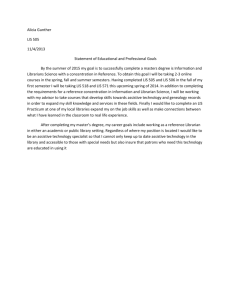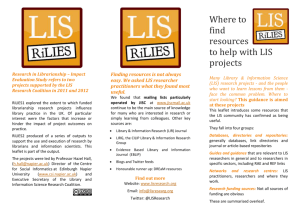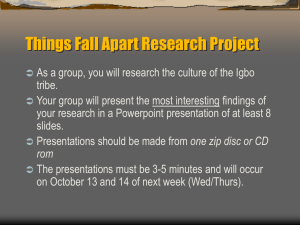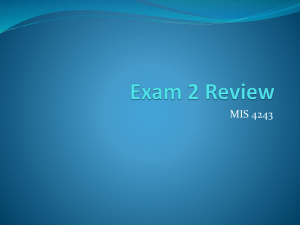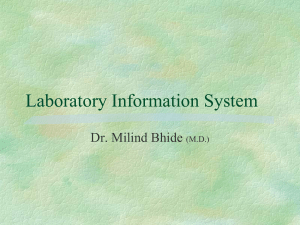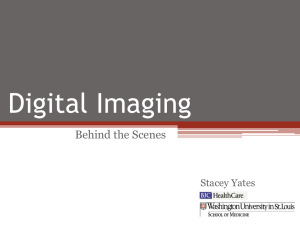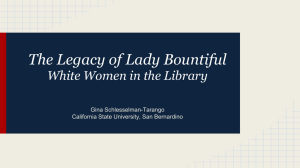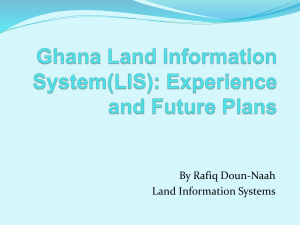information organization
advertisement
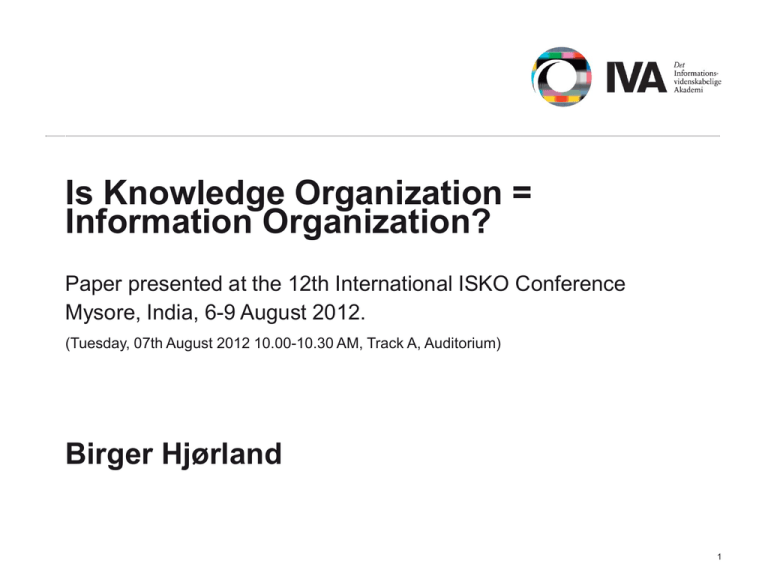
Is Knowledge Organization = Information Organization? Paper presented at the 12th International ISKO Conference Mysore, India, 6-9 August 2012. (Tuesday, 07th August 2012 10.00-10.30 AM, Track A, Auditorium) Birger Hjørland 1 1. Introduction We are participating in an ISKO conference (International Society for Knowledge Organization). Here the term Knowledge Organization (KO) is being used. Sometimes, however, the term information organization (IO) is being used. This is the case, for example, in Svenonius’ well known monograph (2000) The intellectual foundation of information organization. Also, for example, at the School of Information Studies at the University of Wisconsin-Milwaukee the name of the subject has recently changed from KO to IO. 2 1 1. Introduction We may therefore ask: Is Knowledge Organization = Information Organization? Are KO and IO synonyms? In addressing this issue, my aim is twofold: 1) to argue which term should be preferred as label. 2) To provide a theoretical basis for answering the general question: When should two concepts be considered synonyms? 1 3 2. Etymology and conceptual analysis? Intuitively one might perhaps respond: The word ”knowledge” and the word ”information” are two different words with different meanings. For this reason KO and IO cannot be synonyms. We might look up the meanings of the words “knowledge” and “information” in dictionaries, encyclopedias (or the hard way: studying the theoretical literature on each concept). There has been (and may still be somewhere) a belief that the true meaning of terms may be found by studying their original meaning (i.e., their etymology) or in their inherent (a priori) meaning. 1 4 2. Etymology and conceptual analysis? Today the etymological method of establishing the meaning of terms is generally seen as problematic. Users of language are not necessarily committed by the origin of a word or how it has formerly been used. Scientific terms change meaning with scientific theories. Basic physical concepts, for example, do not have the same meaning in the physics of Aristotle and Newton. Conceptual analysis as a priori definition of concepts (Hanna, 1998) is a philosophical approach that came under heavy criticism, and by the end of the 1970s was widely regarded as defunct. 1 5 2. Etymology and conceptual analysis? Conceptual analysis also seems to be an insufficient method because the meaning of terms changes with scientific theories. We cannot, therefore, expect to find the true meanings of the words “knowledge” and “information” by etymological or by a priory philosophical analysis. We have to consider their meaning in relation to the scientific theories of which they form parts. What kind of theoretical role do the concepts of knowledge and information play in library and information science and in KO? 1 6 3. ”Information” and ”knowledge” in LIS I have been writing about the concept of information in LIS for a long time and cannot go deep into this issue here. The term came into LIS with the computer, but has in my opinion never been theoretically well supported. I agree with Furner (2004) that we could very well have “Information studies without information”! Often our concepts seem unfortunately to reflect what Konrad (2007) termed “poor terminological hygiene”. 1 7 3. ”information” and ”knowledge” in LIS Zins (2006) suggested “Redefining information science: From information science to knowledge science”. That would indeed point to KO instead of IO as the preferred name for our field. I do not think it would be wise to follow Zins suggestion because: 1. The terminology is confused enough already; 2. There are already other disciplines devoted to the study of knowledge (e.g. “theory of knowledge”, sociology of knowledge and “science studies”). 3. Information science/LIS is primarily about documented knowledge (documents). 1 8 4. Consistent patterns of use? Wittgenstein defined the meaning of terms as their use: In order to define a term you must study how it is used. I have made a study in the Social SciSearch of four terms: • Information organization (IO), • Organization of information (OI), • Information architecture (IA) and • Knowledge organization (KO) Each term studied both in the whole database and in the part limited to LIS. For each term and each database were ranked 1) the most cited authors 2) the most cited journals or works and 3) the most cited references. 1 9 4. Consistent patterns of use? Knowledge Organization, KO In whole SSCI Most Rank #1 cited HJORLAND B authors DAHLBERG I BEGHTOL C CHI MTH (cognitive science) KOGUT B (knowledge management) 1 Knowledge Organization in LIS Most cited authors Rank #13 HJORLAND B DAHLBERG I BEGHTOL C RANGANATHAN SR SOERGEL D 10 4. Consistent patterns of use? Information Organization, IO In whole SSCI Most Rank #4 cited MILLER GA (cognitive science) authors SVENONIUS E BADDELEY A (cognitive sci) PORTER ME (management) ZAND DE (management) 1 Information Organization, IO In LIS Rank #16 SVENONIUS E BELKIN NJ (LIS not KO) CHOO CW (knowledge management) INGWERSEN P (LIS not KO) TAYLOR AG 11 4. Consistent patterns of use? Organization of Information, OI In whole SSCI Most Rank #7 cited DUNCAN J (cognitive science) authors WILLIAMSON OE (economics) ALCHIAN AA (economics) POSNER MI (cognitive science) KAHNEMAN D (cognitive Organization of Information, OI In LIS Rank #19 CASE DO (Information seeking) DAVENPORT TH (knowledge management) FIDEL R KWASNIK BH PATTON MQ (evaluation research) science) 1 12 4. Consistent patterns of use? Information Architecture, AI In whole SSCI Most cited authors 1 Rank #10 ROSENFELD L NIELSEN J BRANCHEAU JC WURMAN RS MARCHIONINI G Information Architecture In LIS Rank #22 ROSENFELD L NIELSEN J BRANCHEAU JC DILLON A MARCHIONINI G 13 5. Interpretation Each of the four concepts has a unique set of most cited authors seemingly indicating that we are dealing with four separate fields (which of course change if more than just the top five are considered; data not shown), Two of the terms (KO and IA) seem to be reasonably consistently used: in LIS both terms display a list of connected researchers, in social sciences the term KO is also used by researchers from cognitive science and knowledge management, but with LIS as the dominant field. 1 14 5. Interpretation The other two terms (IO and OI) are clearly not consistently used to delimit a common field. Svenonius (2000) and the well-known textbook Taylor & Joudrey (2009) are clearly the publications that associate IO with our field, but the terms are used by other fields as well and no consistent pattern is visible (remark that another textbook, Rowley. & Hartley (2008) Organizing knowledge. An introduction to managing access to information tries to have it all by combining knowledge and information in the title). 1 15 5. Interpretation Why do some researchers prefer IO to KO? There seems to be no well-argued theoretical reason to do so. Svenonius (2000) is clearly a book in the tradition of KO. Does KO sound old-fashioned? Is that term more connected to print culture than to the digital world? Or is it, as Webber (2003) suggests, more a strategic choice made in order to “sell” the field than it is based on theoretical arguments? 1 16 5. Interpretation Is information architecture (IA) a new field? An emerging discipline? Or is IA just a new name for the field covered by KO? A course in IA (or a book about IA) is clearly focused on internet technologies, which is to day an important focus. The influential text (Rosenfeld & Morville, 1998; Morville & Rosenfeld, 2006) is a good one, also from the perspective of KO. 1 17 5. Interpretation The decision to use the new term IA may be motivated: To signal something new and cool To have a term/field delimited to KO on the Internet To have a term for a community different from our KO community Disciplines should be defined theoretically, not by persuasive terminology just as basic principles should be independent of media (print or Internet). 1 18 5. Interpretation My suggestion is therefore that KO is the field that provides the basic principles also for IA (although clever people identifying themselves with IA also contribute to these basic principles). KO and IA should certainly not be considered two different fields/disciplines because the basic principles have to be the same. We should not have separate courses in KO and IA, but courses in KO covering different theoretical approaches and different kinds of media and technologies. 1 19 6. Conclusion The choice of the name for the field is not just an empirical question. Empirical studies can tell the uses of the terms, whether there is a consistent pattern in the use of a given label. To choose a label is also to work for developing the field in a certain direction. It concerns basic theoretical analyses. There is a need to connect KO more to other knowledge fields such as the theory of knowledge, the sociology of knowledge/science and science studies. 1 20 6. Conclusion Therefore, my conclusion is that KO should be the preferred term. However, if the tendency to shift to IO continues, I would have to follow the trend: One cannot isolate oneself and one cannot maintain a private language that nobody else uses. I still believe, however, that the term KO is worth arguing for. 1 21 References Furner, J. (2004). Information studies without information. Library Trends , 52(3), 427-446. Hanna, Robert (1998). Conceptual analysis. IN: Routledge Encyclopedia of Philosophy, Version 1.0, London: Routledge. 1 22 References Konrad, A. (2007). On inquiry: Human concept formation and construction of meaning through library and information science intermediation (Unpublished doctoral dissertation). University of California, Berkeley. Retrieved from http://escholarship.org/uc/item/1s76b6hp Morville, P. & Rosenfeld, L. (2006). Information architecture for the world wide web (3rd ed.). Sebastobol, CA: O'Reilly Media, Inc. Rosenfeld, 1 L. & Morville, P. (1998). Information architecture for the World Wide Web. 1st ed. Cambridge Sebastopol, CA : O'Reilly. 23 References Rowley, J. & Hartley, R. (2008). Organizing knowledge. An introduction to managing access to information. 4th edition. Aldershot, Hampshire: Ashgate. Taylor, A. G. & Joudrey, D. N. (2009). The organization of information. 3rd edition. Westporet, Connecticut: Libraries Unlimited. Webber, S. (2003). Information science in 2003: a critique. Journal of Information Science. 29(4), 311-330. Zins, C. (2006). Redefining information science: From information science to knowledge science. Journal of Documentation, 62(4), 447-461. 1 24
